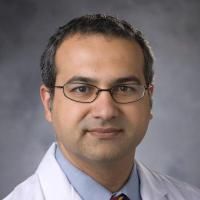Synchronous Abdominal Wall and Small-bowel Transplantation: A 1-year Follow-up.
Date
2020-07-24
Journal Title
Journal ISSN
Volume Title
Repository Usage Stats
views
downloads
Citation Stats
Abstract
Abdominal wall-vascularized composite allotransplantation (AW-VCA) has evolved as a technically feasible but challenging option in the rare event of abdominal wall reconstruction in patients whose abdomen cannot be closed by applying conventional methods. The authors conducted the first synchronous child-to-adult recipient AW-VCA using an arteriovenous loop technique. This article presents a 1-year follow-up of the patient's postoperative course. Frequent skin biopsies were performed in accordance with Duke Institutional Review Board protocol, with 3 episodes of rejection treated with high-dose steroids and Thymoglobulin (Genzyme Corp, Cambridge, Mass.). The patient developed an opportunistic fungal brain abscess secondary to immunosuppression, which led to temporary upper extremity weakness. Future considerations for AW-VCA include a modified surgical technique involving utilization of donor vein graft for arteriovenous loop formation. In addition, reduction in postoperative biopsy schedule and changes in immunosuppression regimen may lead to improved outcomes and prevent unnecessary high-dose immunosuppression.
Type
Department
Description
Provenance
Subjects
Citation
Permalink
Published Version (Please cite this version)
Publication Info
Atia, Andrew, Andrew Hollins, Ralph F Erdmann, Ronnie Shammas, Debra L Sudan, Suhail K Mithani, Kadiyala V Ravindra, Detlev Erdmann, et al. (2020). Synchronous Abdominal Wall and Small-bowel Transplantation: A 1-year Follow-up. Plastic and reconstructive surgery. Global open, 8(7). p. e2995. 10.1097/gox.0000000000002995 Retrieved from https://hdl.handle.net/10161/25655.
This is constructed from limited available data and may be imprecise. To cite this article, please review & use the official citation provided by the journal.
Collections
Scholars@Duke

Andrew N Atia

Debra L Sudan
I am interested clinically in all abdominal organ transplants (kidney, liver, pancreas and intestine). I am specifically interested in intestine transplantation and improving intestine graft preservation and long-term graft function and patient survival. In addition, I am interested in monitoring of patients to improve our ability to determine the etiology of graft dysfunction when there are complex interacting issues such as infection and rejection as well as examining better immunosuppressive regimens to maintain excellent graft function. We have numerous research studies and trial to improve our knowledge in these areas and thereby contribute to improved patient outcomes!

Suhail Kamrudin Mithani

Kadiyala Venkata Ravindra

Detlev Erdmann
Unless otherwise indicated, scholarly articles published by Duke faculty members are made available here with a CC-BY-NC (Creative Commons Attribution Non-Commercial) license, as enabled by the Duke Open Access Policy. If you wish to use the materials in ways not already permitted under CC-BY-NC, please consult the copyright owner. Other materials are made available here through the author’s grant of a non-exclusive license to make their work openly accessible.
